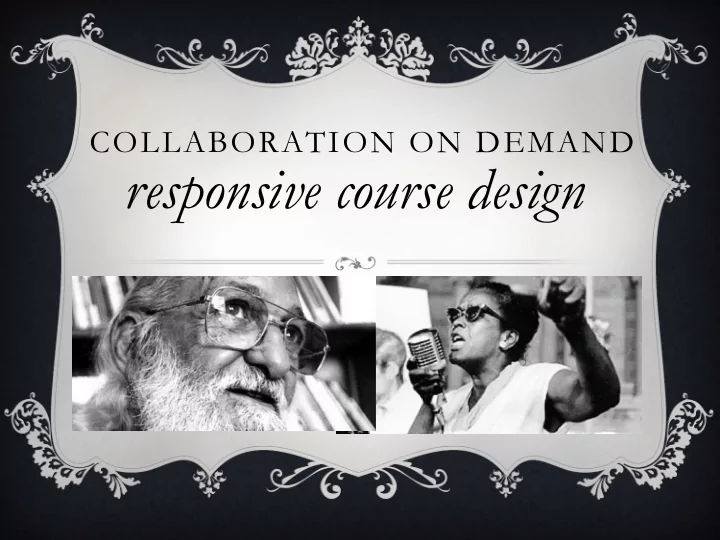

COLLABORATION ON DEMAND responsive course design
Extra-Talking Practices elizaBeth Simpson University of Illinois at Urbana
The problem… What we don’t know we’re doing still has consequences.
The problem…
Outcomes suffer… … because verbal thinking and expression alone are insufficient for some problems
Outcomes suffer… … from differential participation ! Learned patterns of verbal interaction ! Patterns of social dominance and submission ! Implicit bias Lost voices Group atrophy Inequitable resource allocation
The problem…
Extra-Talking Practices Not verbal conversation, discussion, or dialogue… … intentional processes … implemented at the level of the group …which contribute to mutual comprehension of the issue at hand
Extra-Talking Practices Because they are not “normal,” they disrupt the ”norm” ! Destabilize social patterns of participation ! Engage non-verbal competencies
Extra-Talking Practices Modifying turn taking Constraining verbal communication Engaging other competencies
Extra-Talking Practices Everywhere and nowhere… Psychology Disability studies ! Play therapy ! Universal instructional design ! Art therapy Business/Nonprofit Communication Organizations ! Intergroup dialogue ! Teambuilding Education Popular education ! Learning styles ! Social justice education Public Schools Performance studies Civic Activism/Grassroots Organizations ! Applied theater
Extra-Talking Practices THEORISTS “We know what to do but not how” PRACTITIONERS “We know what to do, but not why it works”
Extra-Talking Practices Begin with making what’s there VISIBLE
Extra-Talking Practices A resource across contexts… Data archive Practitioner resource
Extra-Talking Practices http://datadryad.org/
Extra-Talking Practices http://www.playmeo.com/ice-breaker-get-to-know-you-games/mapping
Extra-Talking Practices http://www.playmeo.com/ice-breaker-get-to-know-you-games/mapping
Extra-Talking Practices http://www.visual-literacy.org/periodic_table/periodic_table.html#
Extra-Talking Practices Description: Image Theater includes a variety of workshops designed to develop individual skills of observation and cooperative group interaction. In Image Theater, the body is used to create images that help participants explore power relations and group solutions to concrete problems.* Origin: Brazil, Augusto Boal Context of use: Social justice strategic planning Modalities: Visual, Spatial, Kinesthetic, Logical, Aural Image Materials: None Time: Variable, 10-60m Theater Proprietary ? No * http://brechtforum.org/aboutimage
Extra-Talking Practices Theoretical Resources: • Boal, Augusto. The rainbow of desire: The Boal method of theatre and therapy . Psychology Press, 1995. Practical Resources: • The Forum Project: http://theforumproject.org/whatisto/ imagetheatre/ Video Example: • SOS-Theater of the Oppressed https://www.youtube.com/watch? v=iogXYf5_LqU 25:10- 26:35 Image Theater http://artcorp.org/wp/category/education-and-training-english/
Project Implementation Complete the literature review Propose the theoretical framework* Interview theorists Interview practitioners Compile the raw data and make it available* Design a user platform* Populate the platform with the data* Spread the word See the change * Completed Resource
THANK YOU Raise one hand Extend between one and five fingers to show your interest in this proposal Low interest ! 1.. 2 .. 3 ..4 .. 5 " high interest
Recommend
More recommend